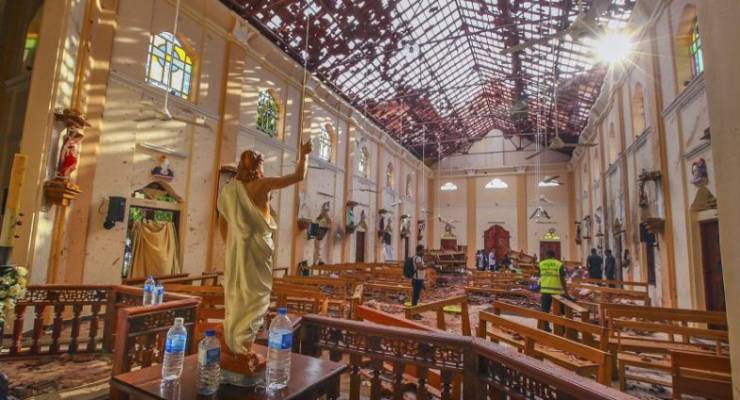
Hours after 290 people were killed in a series of Easter Sunday bombings across Sri Lanka, the government moved to enforce a nation-wide social media blackout to stop the dissemination of “false news” that could potentially ignite tensions.
Eight explosions rocked the South Asian country — including six suicide bombings — in the cities of Colombo, Batticaloa and Negombo, targeting Christians observing Easter mass at three churches and tourists at three high-end hotels.
As officials swoop in on alleged perpetrators behind the wave of terror attacks, the government announced it had “taken steps to temporarily block all the social media avenues until the investigations are conclude” including Facebook, Whatsapp, Instagram and Viber.
At least 24 people have been arrested in connection with the bombings, but their identities remain unknown and security forces are continuing to conduct investigations. As the investigations unfold, Crikey takes a look at the nature of the social media ban. Is it doing more harm or good?
Why was the ban put in place?
The Sri Lankan government’s reasoning for the social media blackout was to counter fake news about the perpetrators, and to mitigate anti-Muslim backlash while fingers are being pointed at a fringe Islamist group known as National Thowfeek Jamaath.
Concerned about growing tensions between community groups, the Minister of Mass Media and State Minister for Defence Ruwan Wijewardene told reporters on the weekend that he wanted the media to suppress naming the attackers.
“Don’t give extremists a voice. Don’t help to make them martyrs,” Wijewardene said.
Of the 290 people killed, at least 39 tourists were killed according to the island nation’s tourism minister. Two of the deceased include Australian mother Manik Suriaaratchi and her 10-year-old daughter Alexendria.
This is not the first time the Sri Lankan government has blacked out social media to deter unrest amid fears of escalation. In March last year, after weeks of anti-Muslim riots in Kandy, the government directed internet service providers to restrict access to social media. The restrictions lasted for up to two weeks.
Has this happened elsewhere?
Social media platforms have come under scrutiny for the easy dissemination of false information that has fuelled ethnic and religious tensions in India and Myanmar.
To combat fake news going viral, messaging service WhatsApp (which is owned by Facebook) last year overhauled its forwarding system and limited the number of people users could forward messages to. In India, it is restricted to five people; everywhere else, it is 20 — reduced from a previous 250 people.
One example of false information being used to incite violence against Rohingyas in Myanmar is Myanmar leader Aung San Suu Kyi’s spokesman Zaw Htay sharing images that turned out to be misleading.
A report by the Business for Social Responsibility — published by Facebook — found that social media services like Facebook need to better regulate content and “increase engagement with both Myanmar officials and civil society groups”.
Social media and internet blackouts have also been used to suppress dissent and protesters organising during the Arab Spring. Internet service providers, telecommunication services and mobile providers restricted or shut off services at the behest of governments. In January 2011, during Egypt’s Arab Spring uprising, former president Hosni Mubarak’s regime effectively switched off the internet. This restriction was lifted after five days.
Months after Mubarak effectively disconnected Egypt from the internet, a United Nations report in June 2011, stated that disconnecting people from the internet was a human rights violation and against international law.
The President of Chad in Central Africa, Idriss Deby, has also ushered in social media restrictions to dampen protests against his 29-year rule. The social media blackout has been in place for a year now.
Does a social media ban do more harm than good?
While curtailing the spread of false information in the wake of the deadly bombings is a noble goal, some critics have argued that a blackout does more harm than good as it restricts useful information and communication, and makes it difficult for the family and friends of those affected to contact each other.
BuzzFeed journalist Megha Rajagopalan observed on Twitter: “People in Sri Lanka rely on social media to communicate with friends and family. Imagine attacks like this happening in your city — and imagine not being able to find out if people you know are OK because Facebook is suddenly blocked.”
Senior research fellow with the Institute of Strategic Dialogue in Canada, Amarnath Amarasingam called the state of emergency and blackout a “bad idea”. “The problem with curfews and a state of emergency after an attack is that it really gets in the way of what people need after a tragedy: vigils, public shows of solidarity, and return to normalcy,” he said.
New York Times technology reporter Kara Swisher disagrees. She described feeling relieved about Sri Lanka’s government shutting down social media: “my first thought was ‘good’”. “The toxic digital waste of misinformation that floods these platforms has overwhelmed what was once so very good about them.”
What do you think of the ban? Send your comments (with your full name) to boss@crikey.com.au.








Turning off social media was probably wise in Sri Lanka (SL). Despite the worrying intelligence failure SLGov probably knew who was likely to be responsible but would have to be very careful since there are many possible explanations for terrorism. SL is a country where it appears the mostly Buddhist (70.2%) Sinhalese have reason to worry about the Hindu (12.2%) and Christian (9.7%) Tamils thanks to most recently 30 years of civil war (ended thanks to Chinese arms assistance) and everybody worries about the Muslims (9.7%) due to the international situation. SLGov had apparently realised in advance that they would need to be able to quickly disable the mechanisms, social media apps, which could be used to most easily organise counter strikes against presumed perpetrators which would almost certainly be against further innocents. As well as further horror this would interfere with investigating the initial strikes and potentially destabilise the country further and stretch security forces too far for an efficient response.
SL apparently viewed social media as a potentially destructive mechanism in times of crisis, which as well as channelling and amplifying existing public hatreds could also be used by sufficiently sophisticated crisis instigators to create secondary effects at a strategic level (like a large scale version of having a secondary bomber waiting at a bombing site for first responders).
While turning off social media may also generate strong anti Gov sentiment (people are now used to publishing their unsubstantiated prejudices to the web and regard it as a right), SLGov got ahead of the story quickly and identified alleged perpetrators and managed to spin the action as protective. Closing down social media will also limit the expected anti SLGov blowback for a while. Meanwhile citizens can still use their phones as phones and to text loved ones for news. Anti democratic sure but with social media potentially weaponised an understandable action.
Surely large numbers would simply continue to access the platforms via foreign VPN sites anyway. This happens in countries that block social media sites on a permanent basis.
Maybe the thinking is that it would deter hotheaded rabble-rousers, rather than people with the patience and know-how to use a VPN.
Is this what will soon happen throughout the West – the return of the Chief Censor (who never left in NZ – hence the ease of banning dissemination of the Christchurch murderer’s manifesto).
When does fake news become inconvenient news or something our betters deem lese majeste?
Yet another example that the high tide of civilisation passed in the 70s.